The famous member of Peter, Paul and Mary had a Michigan connection in more ways than one.
Noel Paul Stookey achieved world-wide fame as 'Paul' in Peter, Paul and Mary, the most important and successful folk music trio of the 1960's. During that decade, Peter, Paul and Mary charted 20 singles on Billboard's Hot 100, including 5 Top Ten hits ("If I Had A Hammer", "Puff The Magic Dragon", "Blowin' In The Wind", "Don't Think Twice It's All Right", "I Dig Rock And Roll Music") and the group's sole #1 – 1969's "Leaving On A Jet Plane". In addition, the trio had 11 hit albums, including two that reached # 1; their debut "Peter, Paul & Mary" in 1962 and "In The Wind" in 1963.
Only a minority of the fans of Peter, Paul, and Mary, however, know that Stookey moved to Michigan when he was an adolescent, and that he started his recording career in the state as a member of a high school doo wop vocal group called The Birds Of Paradise. Fewer still realize that he began honing his skills as an entertainer and folksinger while a freshman at Michigan State University, and that his first college sweetheart was a pretty young co-ed from Bay City, Michigan.
Stookey was born in Baltimore, Maryland, in 1937. He started playing the guitar at the age of 11 - a Kay electric with a semi-acoustic body. He reworked it, adding some long-handled volume and tone control knobs on the guitar after his family moved to Birmingham, Michigan, the following year.
During high school, Stookey and his best buddy Jim Mosby became fascinated by the early rock and roll sounds being put on record by black vocal groups. These included "Such A Night" by The Drifters, "Real Humdinger" by The Five Pearls, and "Work With Me Annie", "Sexy Ways", and "Annie Had A Baby" by Detroit's own Hank Ballard & The Midnighters. The subject matter of these songs concerned sex – just the kind of information that young high school lads wanted to learn about but was not taught in classes – at least not as interestingly as on these discs.
In order to hunt down such treasures, Stookey and Mosby had to frequent a black-owned record shop in Pontiac that saw few white customers. Stookey described the shop as narrow, with a floor of stained checkerboard linoleum squares, and open bins of singles and albums on either side. The owner sat on a stool at the back of the store, never paying too much mind to the pair of gawky white boys thumbing through the bins. Of course he had a large boxer security dog that padded up and down the aisle, no doubt giving serious pause to anyone who was even thinking about stealing anything. 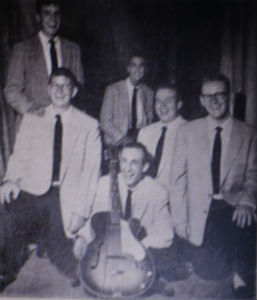 Birds of Paradise - Stookey with guitar
Birds of Paradise - Stookey with guitar
After making their purchases, the pair would take the records home and, with Mosby's encouragement, Stookey pulled apart the arrangements of the songs and assigned the various vocal parts to the members of the doo wop group he had put together with some other high school friends. Since Mosby was devoid of musical talent, he was made the group's official emcee. Inspired by the popularity of songs recorded by groups with bird names such as "Gee" by The Crows, "Crying In The Chapel" by The Orioles, and "Earth Angel" by The Penguins; Stookey came up with 'The Birds Of Paradise' as the moniker for the quintet that he formed during the winter of 1954.
The Birds Of Paradise started with a bang when they auditioned and then won the talent contest on Ed McKenzie's television show in Detroit! This led to two successful performances on radio, a two-night engagement at the Birmingham Junior High School, and an appearance at the Detroit Memorial Hospital.
The group also performed during their senior class trip to Washington D.C. In the summer, they sang at a record hop in Pontiac, entertained at a visiting Birmingham assembly, and made a third and final radio appearance on DJ Ted Donay's program before the group members went off to college in the fall. 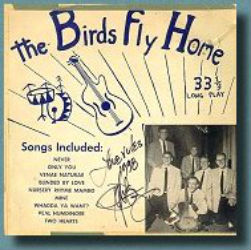 Birds of Paradise album
Birds of Paradise album
The Birds of Paradise reconvened one more time over Thanksgiving break to once again claim victory on Ed McKenzie's show, and also to produce a nine-song LP called "The Birds Fly Home". The first side was ecorded at Birmingham High's Little Theatre with an introduction by Jim Mosby, and the second side was recorded live at a dance where the Birds Of Paradise appeared that November. The album included several of Stookey's original compositions as well as covers of "Only You" by The Platters and "Two Hearts" by The Charms. Following the break, Mosby returned to the University of Michigan and Stookey was back to being a Spartan at Michigan State.
Mary Hewes was born at Mercy Hospital in Bay City in 1937. Her father, Milton, was the city editor of the Bay City Times. Mary's mother had a teaching degree from Eastern Michigan and taught one year at Kolb School in Bay City. She had to quit when she married Milton the following year. Such were the rules for female teachers in the 1920's.
Bay City was a wonderful place to grow up, and Mary and her best friend Judy Piper loved to go to White's Drive-In on Euclid Avenue, the hot spot for teens. When she was a senior, Mary bought the popular hits of the day, "Sh-Boom" by The Crew-Cuts, "Hearts Of Stone" by The Fontaine sisters, and "Sincerely" by The McGuire Sisters. Mary also took piano lessons but lost interest after several years. She had to play in her mother's shadow, an accomplished pianist who corrected everything Mary played. 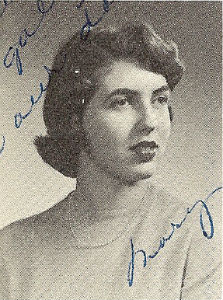 Mary Hewes - 1955
Mary Hewes - 1955
Mary worked on Bay City Central's yearbook during her senior year, and is pictured with a date at the annual Handy-Central dance. Following her graduation, Mary enrolled Michigan State University in the fall of 1955. She chose MSU, in her words, "just to be hateful" since her brother was attending rival University of Michigan and expected her to follow him there. Mary said she started studying Home Economics at MSU because she was "never allowed in the kitchen at home." After discovering it was not for her, she went into the School of Journalism.
During the 1955/56 school year at Michigan State, there was a controversy over the fact that many co-eds were wearing Bermuda shorts to class even in the colder months. The professors wanted the girls in skirts, so in an act of semi-open rebellion the girls adopted the technique of wearing their shorts under a trench coat. It was an innocent time on campus.
Mary met Noel Stookey at a Delta Upsilon party at MSU. Stookey was a member of the fraternity, and she was dating one of his fraternity brothers at the time. She remembered thinking that he was "so different from anybody she had ever been around and that he was very witty and charming". She said that eccentric might be a term that would be used today. Mary also used the word "kooky", but said it would be "kooky" in a very nice way.
Stookey was performing at the party - singing songs, playing the guitar, and he was very popular with the crowd. He was already starting to build a fan base on campus. Mary said he had a knack of making up songs as he performed. He wasn't sporting the trademark beard yet, but Mary remarked, "You just didn't see people with guitars in 1955, at least not in Bay City or in East Lansing." She said that Stookey took his guitar every place – even if he was going to get a cup of coffee. He also dressed differently from everyone else on campus, preferring all white outfits most of the time. Mary said "it looked like he worked in a bakery."
It also didn't seem to bother Stookey that she had been dating one of his frat brothers, because he called and asked her out the next weekend. Dating on MSU's campus was different from dating in Bay City. In her hometown, a date most likely meant going to a movie and then to White's on Euclid Avenue. 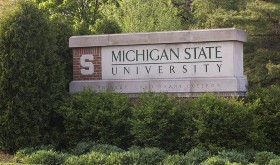 Michigan State Spartans
Michigan State Spartans
With Stookey, the weekend dates usually involved him entertaining at some fraternity or sorority party on campus. They would go the party and he would perform (playing guitar, singing, telling jokes, and dancing a little while he played). Afterwards, they would dance to records at the party and then leave. Since they had to walk back to Mary's dorm, they had to make sure that they had enough time to get there before the curfew. Co-eds who lived in the dorms had an 11:00 p.m. curfew, and you didn't want to get penalized by racking up any "late minutes".
On weekends when he was not performing, they would often go out for Chinese food by taking the bus to downtown Lansing. Stookey lived in Shaw Hall at that time, while Mary lived in Yakley, one of the many female dorms at MSU. Because there were no phones in the dorm rooms, Stookey had to call the desk at Yakley, and then Mary would be buzzed in her room and she would come to the desk to speak with him. Mary was not allowed to visit his room and vice versa in those days.
As might be expected, Mary's dad was not real excited about her new boyfriend when she brought Stookey to Bay City. Looking back, she said "Noel stuck out like a sore thumb. He was very tall and thin and with his all-white outfit (his shoes were white bucks, he had white slacks and he always wore a white dress shirt with sleeves rolled up and no necktie); my father probably thought he was from an insane asylum". Milton Hewes was not pleased. Stookey didn't look like the other boys, and he told Mary that "he was never going to make anything of himself."
Although he was not a hit with Mr. Hewes, Stookey continued to hone his skills as an entertainer, singer and emcee on the MSU campus. He was a success performing at the Water Carnival, a big annual school-sponsored entertainment event on the banks of the Red Cedar River in the spring. 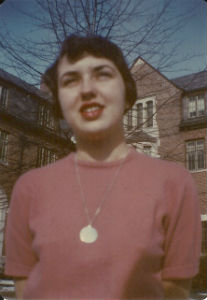 Mary Hewes at MSU
Mary Hewes at MSU
Mary remembered an enjoyable weekend that she and Noel and three other couples spent during the 1956 Memorial Day weekend in Monroe, Michigan, at the home of one of the girls in the party. She recalls it as being lots of fun. It was chaperoned by the parents with guys sleeping on the floor of the family room and the girls bunking down in the bedrooms upstairs. They went to nearby Toledo Beach the next day to swim and lay in the sun. Stookey had hitchhiked to Monroe with his guitar, played at the get-together, and then took the bus back so he could stop by Ann Arbor and see his friend Jim Mosby.
She visited Stookey's family home in Birmingham just once for a wedding. Mary said that he was an only child and that she met his mother but not his father during the visit. Their relationship cooled over the summer, however, when they both went home from school. Noel wrote a few times, but unfortunately Mary didn't keep the letters.
Mary and Stookey didn't see each other when they returned to campus in the fall. Their parting became permanent after Mary decided to leave MSU midway through her sophomore year and transfer to Bay City Junior College. She met her future husband Pete Hinds at the Bay City Junior College in 1957. He had just been discharged from the Army after being stationed in Hawaii for two years. They were seated next to each other alphabetically (Hewes and Hinds). They started going together and then transferred to Central Michigan University in Mt. Pleasant. Mary and Pete got married in the fall of 1958.
Stookey continued to perform on campus and serve as the master of ceremonies at major MSU events including the Water Carnivals and the Homecoming Dances. His skill as an emcee would prove to be very important in a few years. He says "MSU taught me that I could do well if I focused." Besides performing as a solo, Stookey also formed a singing group called The Corsairs. The Corsairs recorded a song for one side of a fund-raising 45 on campus with a tune by Spartan football star Clarence Peeks on the flipside. 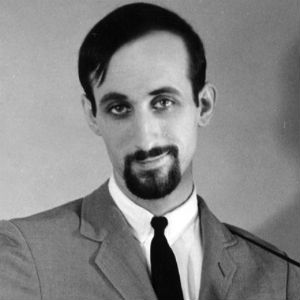 Stookey in New York 1962
Stookey in New York 1962
Noel Stookey left MSU after his junior year when his family moved to Pennsylvania. He relocated to New York City in 1959 and found a job with a company that specialized in the sale of photographic chemicals. Slowly but surely, he started moving back into the entertainment field.
By 1961, Stookey had become the emcee, comedian and occasional singer at the Gaslight, a club in New York City's Greenwich Village. According to singer/guitarist Dave Van Ronk's memoir, The Mayor Of MacDougal Street, Stookey also booked acts at he club. In Van Ronk's words, (Stookey) "was a good mimic and would do a sort of Ernie Kovacs fake German routine, but his masterpiece was his imitation of an old-fashioned flush toilet, and for a while he was billed as 'The Toilet Man'."
One night, he was approached by a club owner and manager of musicians named Albert Grossman, who asked him if was interested in joining a new folk trio. Stookey initially said he wasn't, but after Mary Travers and Peter Yarrow went to his apartment and the three sang together, Peter, Paul and Mary was born.
Noel's name change to Paul was suggested by Grossman, who also handled Bob Dylan at the time. The change was for reasons of alliteration, not as a Biblical reference. The decision had the added benefit of helping each member of the group maintain their individual identities as performers. They were otherwise slated to be called "The Willows".
After rehearsing Yarrow, Stookey and Travers out of town in Boston and Miami, Grossman booked them into The Bitter End, a coffee house, nightclub and popular folk music venue in Greenwich Village. They were an immediate sensation.
The trio signed with Warner Brothers Records and recorded their first self-titled album the following year. It included "Lemon Tree", "500 Miles" and the Pete Seeger hits "If I Had A Hammer" and "Where Have All The Flowers Gone". The album was listed in the Billboard Top Ten for 10 months, eventually selling over two million copies. Peter, Paul and Mary were on their way. 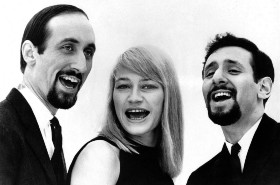 Paul Stookey, Mary Travers, and Peter Yarrow
Paul Stookey, Mary Travers, and Peter Yarrow
She had not been in contact with Stookey for six years when Mary Hewes Hinds picked up a Collier's magazine one summer day while she was working at the Bay City Times. There was a little picture of Peter, Paul and Mary accompanied by a short article about the up-and-coming folk music trio. Stookey's old friend Jim Mosby had been hired as a reporter at the newspaper. Mary introduced him to her childhood friend Judy Piper, and the pair had been dating since Mosby started working at the Times. Mary walked over to him with the magazine and asked him, "Anyone you know?" Mosby was surprised that his old buddy Noel Stookey (now Paul Stookey) was in a national magazine.
Milton Hewes was promoted to the editor of the Bay City Times in 1959. Although he had not hired Mosby, Hewes was very upset when Jim quit his position in 1962 after getting a more lucrative offer from Stookey to become the tour manager for Peter, Paul and Mary. The subject of Noel Paul Stookey was off limits in the Hewes' household from that point on.
Mary said that her father was very conservative and disapproved of Mosby's working with the trio. He was also highly critical of Peter, Paul and Mary's performance at the televised Civil Rights March on Washington in August 1963. The very same event at which Dr. Martin Luther King delivered one of the most famous speeches in American history in front of an estimated crowd of over 250,000 people. _-_NARA_-_542019.tif/lossy-page1-250px-Civil_Rights_March_on_Washington,_D.C._(Entertainment,_Vocalists_Peter,_Paul,_and_Mary.)_-_NARA_-_542019.tif.jpg) March on Washington 1963
March on Washington 1963
From 1962 to 1964, Jim Mosby was on the road with Peter, Paul and Mary. He handled their travel plans and arrangements at the many theatres and other venues where they performed. It was a very exciting time. The group was very hot during that period and were doing one night stands anywhere from five to seven days per week.
Mosby helped manage the office of Albert Grossman from 1965 to 1966. Jim had the opportunity to travel with Bob Dylan to several engagements during that time. Grossman represented an interesting roster of artists besides Dylan and Peter, Paul and Mary; and Mosby also had the opportunity to meet and work with other clients including Odetta, Ian & Sylvia, Gordon Lightfoot, and the musicians who would later record as The Band.
Jim Mosby left the music business in 1966. He had married and now had a child; and he was interested in a job that offered a little more stability and less travel. Although Milton Hewes declared that Mosby would "never be hired back at the Bay City Times", Jim's first love was the newspaper business and he was rehired in 1966 by Ray Kuhn, who was the Time's managing editor and second-in-command under Milton Hewes.
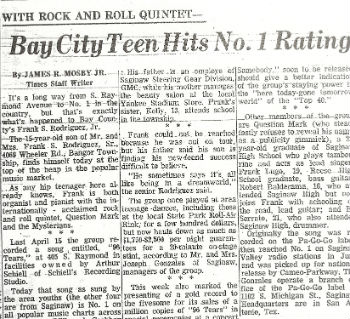 Mosby's article on Frank Rodriguez and "96 Tears"
Mosby's article on Frank Rodriguez and "96 Tears"
One of Mosby's assignments after his return to the newspaper was to write a news article on a teenaged Bay City musician named Frank Rodriguez, a member of ? and The Mysterians, a successful local rock and roll band . The group's recording of "96 Tears" reached the # 1 position on the Billboard Hot 100 in late October, 1966, and the band had been presented a gold record for sales of over one million copies. The article also mentioned the studio of Art Schiell on Raymond Street in Bay City. The small facility, located at the rear of Schiell's home, was where "96 Tears" was recorded that past April. Mosby's news story contained the only mention of Art Schiell's recording achievement of "96 Tears" ever published in the Bay City Times.
The Bay City Times, as well as a number of other papers in Michigan, was owned by Booth Newspapers out off Grand Rapids. In 1972, Mosby was promoted to the position of City Editor at the Jackson Citizen Patriot. He moved to the Muskegon Chronicle in 1976 as the Metro Editor before being transferred to the Kalamazoo Gazette as the Managing Editor in 1979. Mosby became the Editor of the newspaper in 1983. He retired from the Gazette in 2000.
Stookey and Mosby have remained good friends over the years. Noel regularly attends the Birmingham High School Class of 1955 reunions, held every five years. Although Stookey and Peter Yarrow still perform together occasionally, both concentrate primarily on their respective solo careers. Mary Travers passed away in 2009 after battling leukemia for several years.
Noel Paul Stookey met his future wife Elizabeth (Betty) in a chance encounter in a New York subway station. She was a year behind him back in high school in Birmingham, Michigan. Elizabeth was a cheerleader and he sang in The Birds of Paradise. She was more aware of him than he was of her during their high school years. She has said: "I had a terrible crush on him. I thought he was terrific." When they re-met, Elizabeth was finishing a degree at Columbia University in philosophy and comparative literature. She put her career aspirations on hold, however, after the couple married in 1963 and started having children. 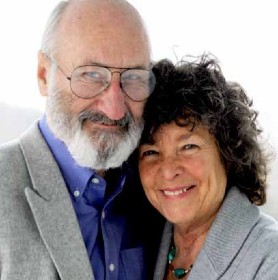 Noel Paul and Betty Stookey
Noel Paul and Betty Stookey
Stookey spent several years as a school-year resident of Massachusetts while his wife Elizabeth served as the Northfield Mount Hermon School chaplain. Following her retirement in 2005, the couple returned to their premanent home in Maine where they still reside.
Mary Hewes Hinds bought several of Peter, Paul and Mary's albums and remained a fan of the group over the years. The only time she saw Noel Stookey again was at a performance of the famous trio at the Flint I.M.A. in 1964. Stookey was the group's spokesman during the show, which featured a short comedic segment where he told jokes and funny stories that reminded one of his days entertaining on the campus of MSU.
Her favorite Stookey composition is "Wedding Song (There Is Love)" which he wrote in 1969 and first performed at the wedding of Peter Yarrow. Coincidentally, both Mary's and Noel's marriages produced three children and both have lasted over 50 years. Mary says her children know that she once dated a famous musician but they never mention it. She also has several grandchildren, the eldest of which is now 28-years-old, ten years older than Mary was when she dated Stookey at MSU.
Mary currently lives in Owosso and says that she doubts that Noel Stookey even remembers her, but I don't believe that's true. Walking along the Red Cedar on a warm spring evening, hand-in-hand with your first Spartan sweetheart...I think Noel Paul Stookey remembers; I think he remembers it all very well.
Watch a 1966 television performance by Peter, Paul and Mary of "Early Morning Rain" with Noel Paul Stookey singing lead. https://www.youtube.com/watch?v=0OCnHNk2Hac

